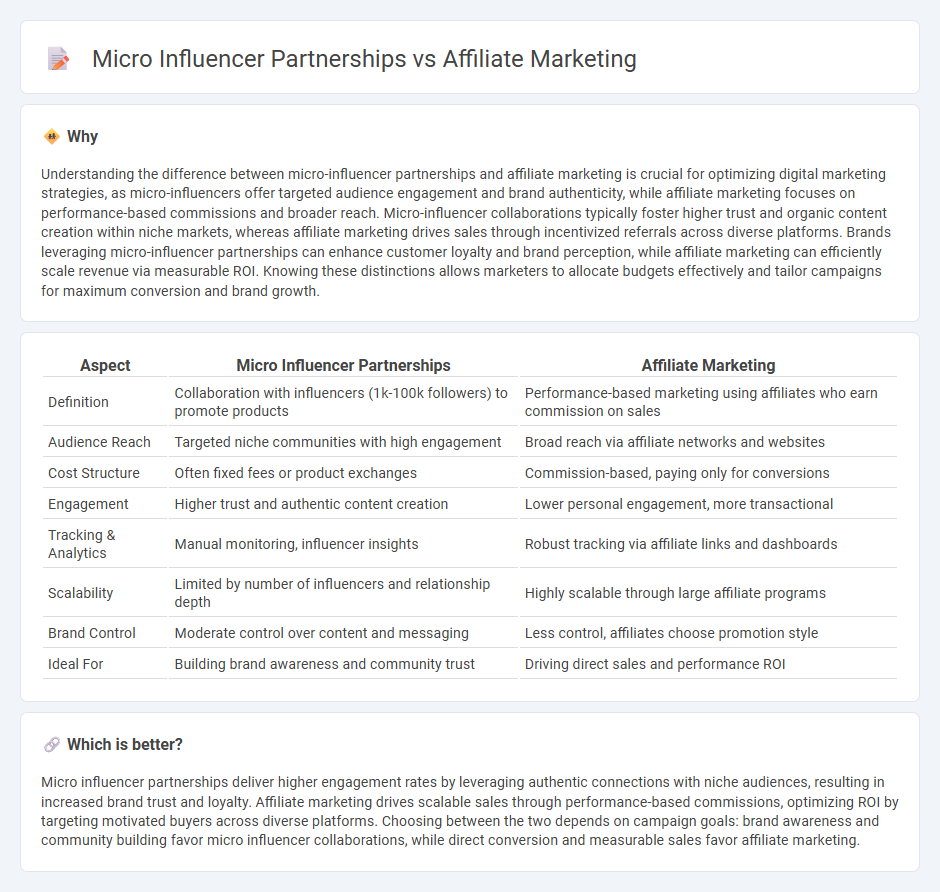
Micro-influencer partnerships leverage authentic connections and niche audiences to drive higher engagement rates and brand trust, while affiliate marketing focuses on performance-based commissions to incentivize sales through broader networks. Both strategies utilize digital platforms for targeted reach but differ in relationship depth and compensation models. Explore how integrating these approaches can maximize your marketing ROI.
Why it is important
Understanding the difference between micro-influencer partnerships and affiliate marketing is crucial for optimizing digital marketing strategies, as micro-influencers offer targeted audience engagement and brand authenticity, while affiliate marketing focuses on performance-based commissions and broader reach. Micro-influencer collaborations typically foster higher trust and organic content creation within niche markets, whereas affiliate marketing drives sales through incentivized referrals across diverse platforms. Brands leveraging micro-influencer partnerships can enhance customer loyalty and brand perception, while affiliate marketing can efficiently scale revenue via measurable ROI. Knowing these distinctions allows marketers to allocate budgets effectively and tailor campaigns for maximum conversion and brand growth.
Comparison Table
| Aspect | Micro Influencer Partnerships | Affiliate Marketing |
|---|---|---|
| Definition | Collaboration with influencers (1k-100k followers) to promote products | Performance-based marketing using affiliates who earn commission on sales |
| Audience Reach | Targeted niche communities with high engagement | Broad reach via affiliate networks and websites |
| Cost Structure | Often fixed fees or product exchanges | Commission-based, paying only for conversions |
| Engagement | Higher trust and authentic content creation | Lower personal engagement, more transactional |
| Tracking & Analytics | Manual monitoring, influencer insights | Robust tracking via affiliate links and dashboards |
| Scalability | Limited by number of influencers and relationship depth | Highly scalable through large affiliate programs |
| Brand Control | Moderate control over content and messaging | Less control, affiliates choose promotion style |
| Ideal For | Building brand awareness and community trust | Driving direct sales and performance ROI |
Which is better?
Micro influencer partnerships deliver higher engagement rates by leveraging authentic connections with niche audiences, resulting in increased brand trust and loyalty. Affiliate marketing drives scalable sales through performance-based commissions, optimizing ROI by targeting motivated buyers across diverse platforms. Choosing between the two depends on campaign goals: brand awareness and community building favor micro influencer collaborations, while direct conversion and measurable sales favor affiliate marketing.
Connection
Micro influencer partnerships enhance affiliate marketing by leveraging trusted niche audiences to drive authentic product recommendations. These collaborations increase conversion rates through personalized content and direct links that track sales performance. Brands benefit from measurable ROI and expanded reach by integrating micro influencers into affiliate programs.
Key Terms
Commission Structure
Affiliate marketing typically offers a commission structure based on a percentage of sales generated through unique referral links, driving performance-based compensation for marketers. Micro influencer partnerships may include fixed payments, product exchanges, or hybrid models combining flat fees with commissions to align with the influencer's reach and engagement. Explore detailed comparisons to determine the best commission strategy for maximizing ROI.
Audience Reach
Affiliate marketing leverages a broad network of content creators to promote products, offering extensive audience reach through diverse channels and driving scalable sales performance. Micro influencer partnerships target niche audiences with highly engaged followers, generating authentic brand interactions and higher conversion rates despite smaller reach. Explore how combining both strategies can maximize your brand's influence and revenue potential.
Content Authenticity
Content authenticity drives higher engagement in affiliate marketing by encouraging genuine product endorsements from trusted creators. Micro influencer partnerships excel in authenticity through personalized storytelling and relatable content, fostering deeper audience connections. Explore strategies to leverage content authenticity in both approaches for maximum brand impact.
Source and External Links
What Is Affiliate Marketing and How to Get Started - Affiliate marketing is a model where third-party publishers promote products or services and earn commissions from sales or traffic they generate, benefiting both businesses and affiliates who build platforms and audiences around the products they like.
Affiliate Marketing 101: What it is and How to Get Started - Affiliate marketing involves three parties: sellers who create products, affiliates who market them to consumers, and consumers who purchase; affiliates earn a commission by persuading their niche audience to buy promoted products.
Affiliate Marketing Guide: All You Need To Know (2025) - Affiliate marketing is a performance-based strategy rewarding affiliates via commissions for driving sales or other actions; beginners start by choosing a niche, building platforms, joining programs, and creating valuable content to attract audiences and comply with guidelines.
 dowidth.com
dowidth.com